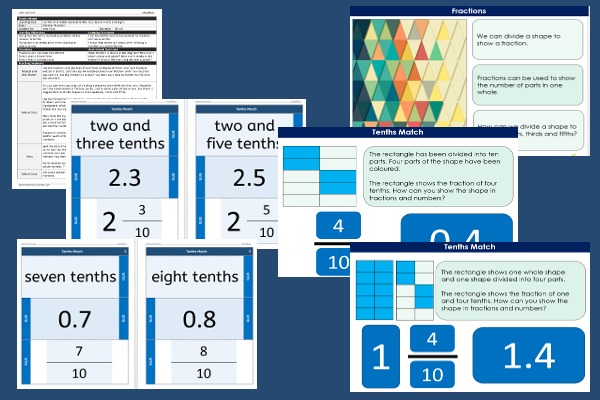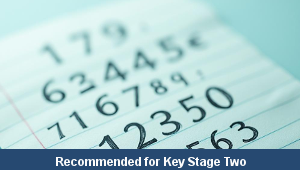Lesson Four – Tenths Match

This maths teaching pack for Key Stage Two gets the children to practise identifying and matching some number values for decimal tenths that have been recorded in both vocabulary words and numerical digits.
The class can explain how to link the digits used in decimal numbers for tenths to the corresponding digits used for the numerators and denominators in the matching non-unit fractions.
Download this teaching pack including a lesson plan, classroom activities and an interactive presentation to practise identifying and matching some number values for decimal tenths that have been recorded in both vocabulary words and numerical digits
Activities in this teaching pack include sets of differentiated cards to select and match some different values of decimal tenths that have been recorded in both vocabulary words and numerical digits when working with non-unit fractions and decimal numbers.
The interactive presentation gets the children to explore how to identify and match different values of decimal tenths that have been recorded in both vocabulary words and numerical digits.
This lesson is part of a maths scheme of work to get the children to explain and record how to illustrate the place value of the sets of matching digits in numbers to two decimal places using concrete equipment, diagrams and equations to model tenths and hundredths. There are teaching activities for shared learning, differentiated worksheets to support independent learning and interactive presentations to introduce concepts and key skills.
-

Maths Arithmetic Assessment
Assess abilities in solving arithmetic number problems for addition, subtraction, multiplication and division when working with informal and formal written calculations
-

Environment
Identify and describe some of the special landscapes and locations that can be found in the world and reflect on how they can be protected and preserved for the future
-

Silent Letter Words
Explore and illustrate the meanings and spellings of some different words with silent letters when using them in a range of topics and scenarios
-

Complaint Letters
Explain and model how to format and structure writing when composing letters of complaint about different issues and scenarios
